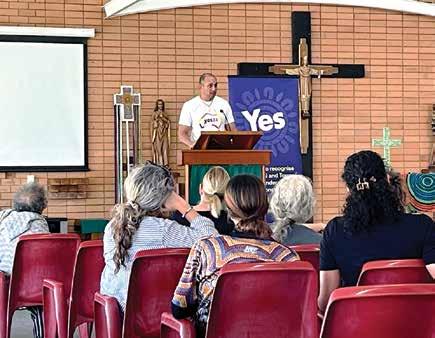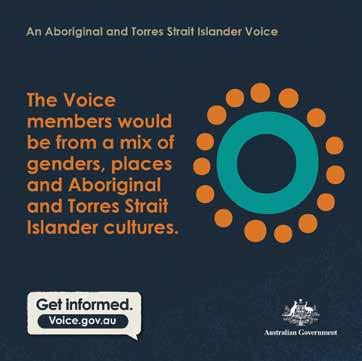
4 minute read
Mayo takes campaign for ‘yes’ to Townsville
STORY AND PIC
BY VELMA GARA
‘Yes’ campaigners Thomas Mayo and Jade Ritchie spoke in Townsville earlier this month, in what were described as “robust” discussions with locals.
“It was a great opportunity to give some information about the historical struggle that leads to this point, understanding all of the different voices or representative bodies that had been established before, that had been taken away by a successive governments,” Mr Mayo said.
Mrs Ritchie said as a mother of two teenagers she wanted them to feel they were part of a national identity.
“This referendum, you know, us coming
Freecall 1800 732 850

Email enquiries@ wakai-waian. com.au together, being recognised in the Constitution, it provides an opportunity for us to all come together and unite,” she said.
40 Douglas St Thursday Is.
Our very own cultural safe, Psychological and Counselling support service that delivers to youme first nations and non-indigenous people throughout “Zenadth Kes” region. The Social, emotional wellbeing bor youme in the community e responsibility and business bor youme everyone.
Questions raised at the information session included the role of Prescribed Body Corporates, Treaty and sovereignty.
There were also questions about setting up the Voice and how it would operate throughout the country.
Mr Mayo said the referendum was a “once in generations” opportunity.
“Yes means change,” he said. “And we need change because of the terrible gap between Indigenous and non Indigenous people.
“And also because the silence in our Constitution, not recognising that our Indigenous heritage and culture is foundational to who we are.”
18 Ishmael Rd, Earlville, Cairns Q 4870 • P J (07) 4211 2700
Email J office@gorimarbleandgranite.com.au
F J (07) 4028 3420 • W J www.gorimarbleandgranite.com.au
A successfully owned and operated Local Family Business.
One statement, signed by more than 70 not-for-profit and commercial organisations dedicated to reconciliation and advancing self-determination, was a strong sign of the volume of support for the Voice, Life Without Barriers Chief Executive Claire Robbs said.
“As we enter the final months towards the referendum, we encourage Australian voters to access information about the Voice and listen to the more than 80 per cent of Aboriginal and Torres Strait Islander people who are asking us to vote ‘yes’,” she said. “All we need to do is accept the generous invitation offered in the Uluru Statement from the Heart.”
Organisations, from health advocates and professionals to trade unions, have spoken out strongly in their support.
National Aboriginal Community Controlled Health Organisation (NACCHO) chair Donnella Mills said her board was right behind the Voice.
“Not much positive came out of COVID, but it did give us a great example of what happens when Aboriginal and Torres Strait Islanders are heard – when we have a voice,” she said.
She said based on government COVID data and the higher level of risk in Aboriginal and Torres Strait Islander peoples, the share of COVID deaths should have been over 2200 people, yet only about 250 Aboriginal and Torres Strait Islanders died.
“NACCHO also believes that the Voice aligns with the National Agreement on Closing the Gap,” she said.
The Royal Australian College of General Practitioners (RACGP) has also supported the ‘yes’ vote.
RACGP President Dr Nicole Higgins said the Voice would help drive changes to improve health outcomes for communities and help address inequities in the health system.
““The RACGP’s position on the Voice builds on our previous advocacy for Aboriginal and Torres Strait Islander peoples’ health, including our endorsement of the Uluru Statement from the Heart recommendations, and our commitment to close the gap in health inequality,” she said.
Chair of the RACGP
Aboriginal and Torres Strait Islander Health Faculty, Dr Karen Nicholls, said the Voice would make a difference for Aboriginal and Torres Strait Islander people across Australia.
“In Australia, this change will ensure that Aboriginal and Torres Strait Islander voices are central in the laws, programs and services that affect us and our communities,” she said.
The Australian Indigenous Doctors’ Association (AIDA) also announced their support. They said embedding the Indigenous Voice to Parliament would recognise the formative place of Aboriginal and Torres Strait Islander peoples in Australia’s history, while ensuring that the wellbeing of Aboriginal and Torres Strait Islander peoples should no longer be discriminated against and politicised.
AIDA Chief Executive Officer Donna Burns said the Voice aligned with their vision to ensure self-determination and equity.
“A Voice to Parliament will help achieve this by providing decision makers with direct advice from those directly impacted by policies and laws,” she said. “The data overwhelmingly demonstrates that an unacceptable health gap persists due to the health inequities experienced by Aboriginal and Torres Strait Islander peoples.”

The Australian Education Union (AEU) said they were proud to endorse the official “yes” case for a Voice to Parliament, which was published this week by the Australian Electoral Commission (AEC).
Yalukit Yulendj (National Aboriginal and Torres Strait
Islander Education Committee of the AEU) chair Russell Honnery said the cases, as laid out by the AEC, highlighted the many vital reasons Australians should be voting “yes” and underscored the importance of a Voice to Parliament.
“By ensuring that Aboriginal Torres Strait Islander Australians have a Voice, and by allowing them to be consulted on matters of direct importance, we can help Close the Gap,” he said.
The board of the NSW/ ACT Aboriginal Legal Service unanimously resolved to support and advocate in favour of the constitutional recognition of Australia’s First Nations and First Peoples, and the constitutional protection of the proposed Voice as has the Environmental Defenders Office (EDO).
The EDO said their staff were united by a sense of pride about living and working on the lands of Aboriginal and Torres Strait Islander nations, and to be share those lands with the oldest continuous cultures in the world.
“Everyone should be treated equitably, and recognition of Aboriginal and Torres Strait Islander peoples through the creation of a Voice is important to creating a fairer society,” they said. “The question asked of Australians at this year’s referendum will be to support the recognition of Aboriginal and Torres Strait Islander peoples through the creation of a Voice to Parliament.
“The creation of a Voice is one of three crucial elements that were outlined in the Uluru Statement from the Heart — voice, treaty, and truth.
“All three elements of the Statement are critical and must be worked on alongside one another.”






